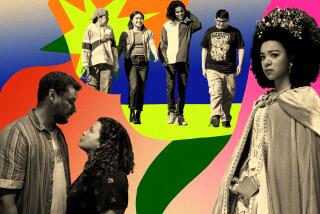‘Big Brother’ Perfectly Captures America’s Psyche
AMAGANSETT, N.Y. — According to the sages of television, the big hit this summer was “Survivor,” while the big disappointment was “Big Brother,” which sputtered to its conclusion last Friday with none of the fanfare that accompanied the blockbuster “Survivor” finale.
Reaping huge ratings, “Survivor” was part game show, part outdoor adventure, part soap opera and part confessional with a cast of intriguing characters, including one bona-fide villain, the Machiavellian Richard Hatch, who became the J.R. Ewing of reality programming. “Big Brother,” on the other hand, was essentially a human ant farm: routine where “Survivor” was dramatic, enervated where “Survivor” was energized. More than one wag compared watching it to watching paint dry.
But sometimes you can watch paint dry and wind up seeing a mural. No one in his right mind would claim that “Big Brother,” which locked 10 strangers in a house rigged with 28 cameras to record their every move, was high art or even low entertainment, but for those who watched enough episodes it may have been the most revelatory program on television in years, and the one that cut closest to the grain of contemporary America. If “Survivor” was pure TV hokum, full of bombast, “Big Brother” was Proustian, inching along day by day, exposing character through gesture, inflection, glance and in the process exposing a great deal about who Americans are and what they value. As it turned out, it wasn’t pretty.
One doubts that CBS had any of this in mind when it embarked on the project. In taking a program that had been a huge hit in Holland, where it originated, and in Germany, the network was no doubt hoping for the same sort of sexual frisson that had ignited the shows there and for the same sort of scheming, while the housemates vied for the $500,000 prize that would go to the person who managed not to get voted out of the domicile by the show’s viewers. But these American contestants turned out to be much more circumspect than their European counterparts when it came to romance and much more conflicted about the competition for the money. Instead of sex and greed, “Big Brother” inadvertently provided a reified dialectic of one of the basic tensions in American life--community versus individuality--and showed viewers an ongoing struggle of people attempting to reconcile the irreconcilable.
Americans have long prided themselves on their independence, a trait said to be shaped in part by the rigors of the frontier. It is one of the reasons we disdain the social-welfare mechanisms that every other industrialized country has. We don’t need help. Our heroes are lonely men, silhouetted against the sky, single-handedly challenging an array of forces. At the same time, Americans think of themselves as part of a larger enterprise: in the 19th century, nation-building; in the 20th century, community building. The country stands poised between these images of the solitary man and the solidarity of the group. Even today our politicians claim to stand bravely against large, impersonal forces while their rhetoric invokes the buzzword of the day: community.
On “Survivor,” which created an ersatz community of “tribes” only to deconstruct it gradually, this tension never really surfaced meaningfully because the community only existed to further each individual’s own plan. You formed alliances to eliminate rivals. “Big Brother,” at once less sophisticated and more honest than “Survivor,” created a more durable and recognizable form of community even though it, too, was artificially constructed. The housemates lived together, slept together, cooked together, ate together and, above all, killed time (lots and lots and lots of it) together and formed not only alliances with one another but eventually relationships--in part a function of the difference between spending a little over a month with one’s companions on “Survivor” as opposed to three months on “Big Brother.” When, in accord with the rules of the game, each contestant had to nominate two housemates for “banishment” every two weeks, there was often pain and tortured justification rather than the bloodless gamesmanship that usually prevailed on “Survivor.”
What was remarkable about “Big Brother” is how little the game seemed to matter in the face of social bonding. In the beginning, the participants worked at forging community, and, in the American pioneering spirit, they sought to banish those who threatened their social order. The first two inhabitants expelled were an African American provocateur who baited his fellow housemates into arguments and a narcissistic “exotic” dancer who, like a Jezebel in an old Western, flirted with the boys in the house and had to be jettisoned to keep the peace. The third was a brittle, chain-smoking housewife who announced that she was going to divorce her husband. That left CBS with seven more or less ordinary folk, all of them duller and much more obvious than the compelling connivers on “Survivor.”
Things went from bad to worse when Brittany, a needy young punk wannabe from Minneapolis with spiked hair and nose rings, was voted out of the house by the viewers. CBS panicked. Brittany was the closest thing they had left to a personality. Attempting to add a new young woman to the mix, the network offered $50,000 to any remaining housemate willing to vacate the premises. No one accepted, but not, or at least so they said, because they all hoped to win the big prize instead. They refused because they didn’t want to leave the house and the community they had built there.
In offering the money, CBS miscalculated big time. What was a TV show to it had become life to the people in the house. They had undergone a transformative experience by being together. On Day 68, a lovable lug named George, who owned a roofing company in Rockford, Ill., mutinied, suggesting that the housemates make a statement by agreeing to leave the house en masse during the live broadcast on Wednesday and thus end the show. (Though “Big Brother” aired six times a week, five of the broadcasts were edited from videotape.) “We’ve got a chance to make history,” he declared, explaining that by turning their backs on the money, they would affirm their commitment to one another and give Americans a vivid demonstration of the value of community.
Even the most jaded viewer might have found this a bold and powerful gesture, and as television, at least, it would have been epoch-making. CBS obviously thought otherwise. It addressed the potential meltdown by taking its Big Brother role seriously. It threatened, cajoled and bullied, huffing that if the contestants left, they wouldn’t get any money, and there would be a set of replacements. Meanwhile, on the “Big Brother” Web site, CBS demonized George, the putative Spartacus, accusing him of everything short of kidnapping the Lindbergh baby and desperately trying to convince viewers to vote him out of the house. On the Wednesday broadcast, his plan was described by “Big Brother” host Julie Chen and resident psychologist Drew Pinsky as “bizarre” and “outlandish,” though many viewers must have thought it perfectly rational--perhaps the only rational response to the show.
As it played out, CBS’s strong-arm tactics probably weren’t necessary. The day after it was hatched, the incipient revolt fizzled for the same reason it had seemed necessary in the first place: self-interest. Eddie, a sullen twentysomething lout from New York who seemed to have internalized the Dead End kids, had second thoughts because he wanted the money. Symbolic gestures about solidarity and community didn’t seem to matter much when measured against $500,000. Jamie, a lantern-jawed, makeup-encrusted beauty queen who is the reigning Miss Washington State, also had misgivings about leaving. Acting like Ginger on “Gilligan’s Island,” she fretted over how her “fans” would react and what it would do to the movie career she fully expected to have after she left the house. Even Curtis, a law clerk who seemed one of the more sensible of the housemates, had been given the privilege of a special furlough to attend the Emmy Awards and returned to the house flush with the excitement of having been recognized. He was a star now, and you could see the other contestants actually swell with anticipation as he delivered his report, and they pondered their new status.
In short, for all the constant blather among the housemates about friendship and values and caring, community was finally no match for money, fame or celebrity. It was no match for the thrill of being on the other side of the television glass, where one could imagine oneself a “character,” as a few of the housemates took to calling themselves. Each contestant, save George and an ingenuous young muscleman named Josh, who seemed to recede from the cameras as the population thinned, was willing to sell out the community so long as he or she could retain his or her moment in the spotlight.
Of course, none of these people was perfectly ordinary to begin with, or they wouldn’t have submitted their names to “Big Brother.” But if they weren’t exactly a microcosm of America, their desperation for recognition nevertheless resonates. George wanted the show to demonstrate how people could unite even under the centrifugal force of television. What “Big Brother” demonstrated is that it is virtually impossible to unite when the greatest satisfaction is to stand alone in the public glare for your 15 minutes (or three months) of glory. In the end, CBS, which mucked up so much, read the American psyche correctly. In the 21st century, who needs community when you can be famous? *
More to Read
The complete guide to home viewing
Get Screen Gab for everything about the TV shows and streaming movies everyone’s talking about.
You may occasionally receive promotional content from the Los Angeles Times.






